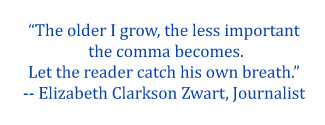Apply them according to a few rules you learned in elementary school, use them to separate items in a list, place them in dates and addresses, and put them where a pause is needed in a long sentence. Proper comma usage seems easy enough, but you might be surprised to find you are making some of the most common mistakes. Comma rules may be a little more complex than you think.
How important is good comma placement? Like correct spelling and grammar, proper punctuation conveys your message more accurately, makes your writing easier to read and understand, and helps you project a professional image.
Here are some tips for using commas correctly.
The Elementary Basics
 1 - The length of a sentence or the need for a pause are not determining factors for placing commas. If a sentence seems too long, it probably is. Adding random commas is not the best solution. Instead, rewrite the sentence or split it into two. Similarly, while a comma may end up at a convenient spot for a pause, its placement is not determined by the need to breathe. Readers will naturally pause as necessary.
1 - The length of a sentence or the need for a pause are not determining factors for placing commas. If a sentence seems too long, it probably is. Adding random commas is not the best solution. Instead, rewrite the sentence or split it into two. Similarly, while a comma may end up at a convenient spot for a pause, its placement is not determined by the need to breathe. Readers will naturally pause as necessary.
2 - Use commas to separate items in a series of three or more. While it is acceptable to omit the comma before the final conjunction, it's not advisable. Grammar Girl makes a good case for always using the final comma for clarity and consistency.
The most misused punctuation marks are probably commas, exclamation points, and ellipses.
3 - Separate the day and year when dates are written in the American style, but not when written in the European style. The year is also followed by a comma when it's not at the end of the sentence.
Search Engine People joined Facebook on March 25, 2008.
Search Engine People joined Facebook on 25 March 2008.
On March 25, 2008, Search Engine People joined Facebook.
When writing just the month and year or just the day and month, no comma is necessary.
Search Engine People joined Facebook in March 2008.
4 - Commas are used to separate elements of an address in a sentence.
The mailing address is 123 Example Street, Cityville, Ontario Q1Q 2W2.
A Little More Complexity
5 - This rule probably isn't all that complicated. It just seems so because it has a fancy name. A vocative comma is used when someone is directly addressed by name or title.
Linda, are you an English teacher?
Its importance is clearly illustrated by the following two sentences which have been shared again and again in social media.
Let's eat Grandma.
Let's eat, Grandma.
6 - Offset a direct quote with commas.
"Making The PROFIT 200 list is an incredible acknowledgement of our achievements," said SEP's founder.
Indirect quotes are not offset.
SEP's founder stated that it's the fourth year in a row the team has been acknowledged.
It is also correct to offset a quote using a colon after the introduction, and it's advisable when the quote is longer than one sentence.
Partial quotes are not offset with commas.
SEP's founder said the award was an "incredible acknowledgement."
7 - Use a comma before the coordinating conjunction when joining two independent clauses.
Optimization techniques continually evolve, but there are some SEO strategies that remain basically unchanged.
Note that the correct placement is before the conjunction "but," not after. It would be incorrect to write Optimization techniques continually evolve but, there are some basic SEO strategies that remain timeless.
A common mistake is to use a comma to splice two sentences together without the coordinating conjunction.
A keyword strategy is crucial, it's of utmost importance to choose the right keywords.
The fix is easy. Either replace the comma with a period to make two sentences, or add a conjunction.
A keyword strategy is crucial, and it's of utmost importance to choose the right keywords.
8 - Parenthetical elements are extra bits of information added to a sentence and separated with commas. A phrase is parenthetical only if it is not essential to the meaning of the sentence.
Linda, the applicant with the most writing experience, got the job.
The applicant with the most writing experience got the job.
9 - Use a comma to separate two or more adjectives that describe the same word and are not joined by a conjunction.
Their knowledgeable, professional manager provided great service.
If you wouldn't normally connect the two adjectives with a conjunction, you shouldn't separate them with a comma.
Their manager has a small corner office.
10 - Introductory words and phrases are followed by a comma. These include transitional words such as "of course" and "additionally."
However, there are always exceptions to the rules.
It is permissible to omit the comma after a short introductory phrase. Some argue that "short" is arbitrary and therefore should not be the determining factor.
Yesterday I discovered an exception.
The most common comma error is overuse. There's a story about a professor who reportedly charges $5 for each comma used in a paper and then rebates the payment for each correctly used comma. Perhaps if we were all subject to such a levy, we'd be much more prudent in our use of commas. Overuse only results in distracting your reader from your message.
It's almost, better, to leave commas out, rather than, put too many in, or use them, incorrectly. 🙂
If you liked this post, you might also enjoy Watch Your Punctuation Online


